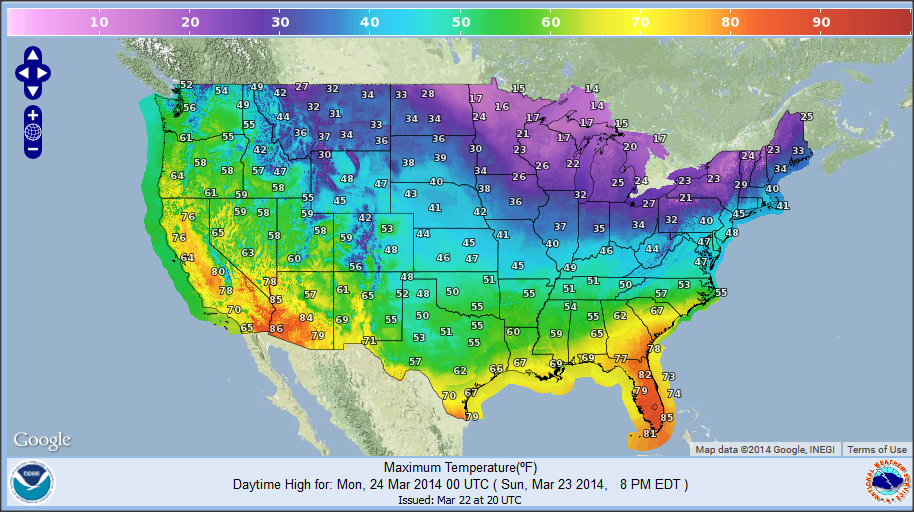Weird Spring Weather Already Breaking Records

Get the world’s most fascinating discoveries delivered straight to your inbox.
You are now subscribed
Your newsletter sign-up was successful
Want to add more newsletters?

Delivered Daily
Daily Newsletter
Sign up for the latest discoveries, groundbreaking research and fascinating breakthroughs that impact you and the wider world direct to your inbox.

Once a week
Life's Little Mysteries
Feed your curiosity with an exclusive mystery every week, solved with science and delivered direct to your inbox before it's seen anywhere else.

Once a week
How It Works
Sign up to our free science & technology newsletter for your weekly fix of fascinating articles, quick quizzes, amazing images, and more

Delivered daily
Space.com Newsletter
Breaking space news, the latest updates on rocket launches, skywatching events and more!

Once a month
Watch This Space
Sign up to our monthly entertainment newsletter to keep up with all our coverage of the latest sci-fi and space movies, tv shows, games and books.

Once a week
Night Sky This Week
Discover this week's must-see night sky events, moon phases, and stunning astrophotos. Sign up for our skywatching newsletter and explore the universe with us!
Join the club
Get full access to premium articles, exclusive features and a growing list of member rewards.
March continues to be much colder than average for Americans living in the path of the wiggly polar vortex. Record low temperatures were set overnight across the northern Great Plains and the North Atlantic regions, and the spring sun won't bring much warmth today, forecasters predict.
Expect high temperatures for March 24 to hit well below seasonal averages, with near-record cold expected in Maine and Massachusetts, the National Weather Service (NWS) said. Today's record low maximum of 26 degrees Fahrenheit (minus 3 degrees Celsius) for Boston was set in 1888. [Photos: The 8 Coldest Places on Earth]
Here are some of the overnight record lows from around the country:
- Lewisburg, Maine: 14 degrees F (minus 10 degrees C)
- Portland, Maine: 11 degrees F (minus 11 degrees C)
- Bridgeport, Conn.: 20 degrees F (minus 6 degrees C)
- Islip, N.Y.: 20 degrees F (minus 6 degrees C)
- Binghamton, N.Y.: 10 degrees F (minus 12 degrees C)
- Lewisburg, W.Va.: 14 degrees F (minus 10 degrees C)
- International Falls, Minn.: minus 26 degrees F (minus 32 degrees C)
The frigid air is the latest Arctic blast to move across the region from Canada, and it owes its southerly extent to fast-moving fingers of wind within the jet stream. Two of these "jet streaks" are positioned above the East Coast, creating a low-pressure zone between them that draws in cold air from the north. As this low-pressure system moves offshore tomorrow, a powerful storm is expected to develop Tuesday night offshore the Mid-Atlantic coast, which will bring snow to much of the region, the NWS forecasts.
Yet even as temperatures plunged across the East, the South and the West were breaking heat records. On Sunday (March 23), Fort Lauderdale, Fla., tied a record high temperature set in 1839, hitting 90 degrees F (32 degrees C). The mercury also busted 80 degrees F in Miami on Sunday, tying the old record set in 2005. More than 4,000 miles (6,400 km) to the north, Cold Bay, Alaska, continued the northern state's unusual warm streak, with a new overnight high of 38 degrees F (3 degrees C). And San Diego, Calif., set a new record minimum temperature of 61 degrees F (16 degrees C) Sunday.
The big span in temperatures between East and West reflects that the East Coast's big chill is mostly a regional event. For example, the months from December 2013 to February 2014 were the eighth warmest on record for the planet, the U.S. National Climatic Data Center said in a report released March 19. The last time the Earth had a record cold month was in December 1916.
Email Becky Oskin or follow her @beckyoskin. Follow us @livescience, Facebook & Google+. Original article on Live Science.
Get the world’s most fascinating discoveries delivered straight to your inbox.

 Live Science Plus
Live Science Plus





